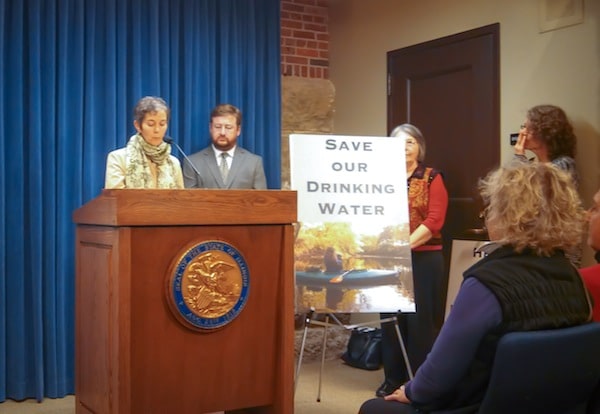Time To Protect the Prairie State From Big Coal
FOR IMMEDIATE RELEASE
April 2, 2014
SPRINGFIELD, IL— Illinois coalfield community residents joined environmental advocates today in calling on Governor Quinn and the Illinois Department of Natural Resources for a plan to reform the regulation of coal mining to better protect communities from water pollution, farmland loss, and to step up enforcement efforts against mining companies who repeatedly violate environmental laws.

“Our livelihoods, our drinking water, and our communities are at risk from coal companies who want to make a quick buck digging up our countryside and then leave unusable land and pollution behind,” said Donald Karns, lifelong resident of Saline County where a proposed Peabody strip mine would destroy the Rocky Branch community. “We need Illinois DNR to do a better job protecting us and our environment. We’re fighting for our future in downstate Illinois, and we need the State of Illinois to have our back.”
A recent surge in coal mining activity has heightened concern that lax enforcement of coal mining regulations by the State of Illinois is threatening the rural agricultural economy, drinking water sources, and natural heritage. Since 2010, Illinois coal output has risen 42 percent.
“The Illinois Coal Basin is the only U.S. coal-producing area where extraction rates are on the rise,” said Traci Barkley, watershed scientist with Prairie Rivers Network. “Illinois needs to take a look at the long game and consider all that is damaged and lost when the one-time extraction of coal is rushed through the permitting process, especially for the sake of export. Our water, our land and our communities are not commodities for industry profit.”
Citizens cited numerous recent examples of mine permits granted despite mining companies’ dangerous histories, mining’s devastating impacts, and at-risk natural resources and water supplies.
The threat posed by coal mining to prime farmland and habitat is a widespread concern across the state. Sue Smith of Stand Up to Coal, brought to light her concerns about the proposed Bulldog Mine, which will undermine nearly 400 acres in Vermillion and Champaign Counties. “If given a green light, Sunrise Coal will use prime Illinois farmland for surface coal facilities. The mine will put local water supplies in question along with our rural community and natural heritage,” Smith said. “The state needs to serve the people and protect the land that has served our community’s way of life for generations.”
Citizens are also alarmed at weak enforcement action when mining companies violate the law. In particular, a pattern of over 600 violations of water quality standards at Springfield Coal Company’s Industry Mine has sparked outrage among local citizens. “The mine continues to pollute while the IDNR renewed permits and put area streams at risk,” noted Ramona Cook, who lives near where Springfield Coal wants to dig more coal—at the proposed Littleton mine. “Illinois should be throwing the book at violators who cut corners and jeopardize our water supply, not giving them permission to pollute again.
A common complaint among residents near mine sites has been an often hostile relationship with regulators in the IDNR Office of Mines and Minerals that can make it difficult for citizens to learn about the full impacts of mine projects and to make their voices heard. In Hillsboro, for example, residents have been fighting the Deer Run Mine and contending with state permitting processes for years. “The lack of information about proposed mines and major changes that are made after the public comment period make it hard for the public to know what will happen to their community. Often we feel that those who are there to protect us are fighting against us,” said Mary Ellen DeClue, of Litchfield and member of Citizens Against Longwall Mining (CALM). “With the Deer Run Mine, we were first told coal slurry would be stored in-ground, only to later find an 80-foot tall high-hazard impoundment will be built in our city limits.”
The advocates welcomed news this week of a new agreement between the IDNR and the Office of the Attorney General to significantly improve the state’s oversight of coal mining. The agreement comes as a settlement in a case regarding a proposed strip mine between two state conservation areas in the Illinois River floodplain near Banner. As Lieutenant Governor, Gov. Quinn stood with community residents in opposition to the proposed mine. Last week a court order proposed major commitments to make reforms in the Office of Mines and Minerals, including measures to enhance public participation, increase the responsibility of mining companies to answer citizens’ concerns, and conserve Illinois’ natural and cultural resources.
Environmental advocates applauded the reforms contained in the agreement, calling them “big first steps.”
“We applaud IDNR and the Attorney General’s office for these new commitments to reform Illinois mining regulation,” said Dr. Cynthia Skrukrud, Clean Water Advocate for the Sierra Club, Illinois Chapter. “They will not solve all of the problems overnight, but these are big first steps toward an Office of Mines and Minerals that gives more consideration to people and our environment— in line with existing mining laws.”
“It’s time to turn the page at the Office of Mines and Minerals, and protect the Prairie State from coal companies that have rural Illinois in their sights,” said Jack Darin, Director of the Sierra Club, Illinois Chapter. “We have seen Governor Quinn and Director Miller do this before, when they stood with the citizens of Banner to save a conservation area from a strip mine. Now we need that leadership more than ever, and we need major changes to protect local communities and our resources from damage and pollution.”
Contact:
Traci Barkley (Prairie Rivers Network): 217-621-3013







